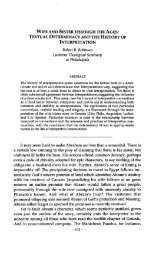FROM EXEGESIS TO HERMENEUTICS - Rice School of Pastoral ...
FROM EXEGESIS TO HERMENEUTICS - Rice School of Pastoral ...
FROM EXEGESIS TO HERMENEUTICS - Rice School of Pastoral ...
Create successful ePaper yourself
Turn your PDF publications into a flip-book with our unique Google optimized e-Paper software.
Schneiders: From Exegesis to Hermeneutics 33Interpretation Theory. 34 Obviously, I cannot summarize in this paper themonumental work <strong>of</strong> these two thinkers, but I will extract a central ideafrom each in order to illustrate how the evolving hermeneutical modelwould affect our understanding <strong>of</strong> biblical scholarship and its relationshipto the pastoral work <strong>of</strong> the Church.A major contribution <strong>of</strong> Ricoeur is his masterful analysis <strong>of</strong> thenotion <strong>of</strong> "text." 35 He challenges our naïve conception that a text issimply "talk writ down," a dialogue fixed on paper. He maintains thatthe act <strong>of</strong> writing fundamentally alters the nature <strong>of</strong> the communicationand calls into play a different set <strong>of</strong> operations from those we use intrying to understand our partner in a conversation. Hermeneutics, saysRicoeur, begins when dialogue ends. 36 Now, exegesis as we described itin the second model is based on an unexamined assumption <strong>of</strong> theessential identity <strong>of</strong> text with talk, precisely the identity Ricoeur challenges.When a text is composed, says Ricoeur, several sea-changes occur.First, the text becomes semantically independent <strong>of</strong> the intention <strong>of</strong> itsauthor. 37 It now means whatever it actually says, not necessarily whatthe author intended to say. By way <strong>of</strong> analogy, if a student objects to thefailing grade I gave her on an exam by saying that I did not understandwhat she meant to say, my response can only be that I had to grade whatshe actually wrote, not what she meant. To write what she meant was hertask. Once the text was written her intention ceased to play a determiningrole. The meaning <strong>of</strong> the text is now independent <strong>of</strong> its author.Unlike the conversation partner who can continually re-express herthought until she makes herself understood, the author ceases to functiononce the text is completed.Secondly, a text is always composed within some form, such asnarrative, poetry, play, or the like. Literary genre is not simply a usefuldevice for classifying texts but is actually a code which shapes thematerial in a certain way and also determines in certain ways the interpretiveactivity <strong>of</strong> the reader. 38 In other words, a text is not astraightforward communication <strong>of</strong> factual data which the reader absorbsbut a strategy for involving the reader in a certain way and on severallevels with the subject matter <strong>of</strong> the text.Thirdly, a text once written is no longer determined by the understanding<strong>of</strong> the original audience. 39 It is now open to whoever can read itand different audiences will read it from within their own situations.34 P. Ricoeur, Interpretation Theory: Discourse and the Surplus <strong>of</strong> Meaning (FortWorth, TX: The Texas Christian University Press, 1976).35 Ibid., pp. 25-44.m Ibid., p. 32.37 Ibid., pp. 25-37.38 ibid., pp. 32-34.m Ibid., pp. 31-32.



